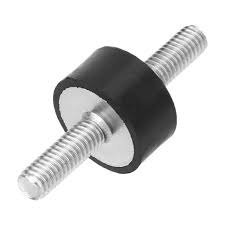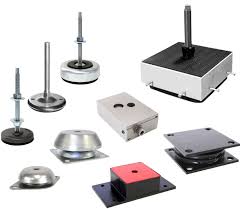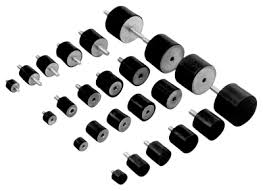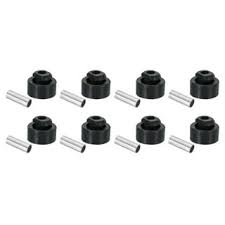Reducing Noise and Vibrations with Mechanical Vibration Isolators
Mechanical vibration isolators are essential in reducing noise and vibrations vibration isolation mounts in various industrial and commercial settings. These isolators serve as a crucial tool for minimizing the impact of mechanical vibrations on surrounding equipment and structures. By employing mechanical vibration isolators, businesses can ensure a quieter and more stable operational environment, leading to improved efficiency and safety. In this article, we will explore the benefits and applications of mechanical vibration isolators in reducing noise and vibrations, and examine how they contribute to a more productive and harmonious work environment.
Mechanical vibration isolators are designed to reduce the transmission of noise and vibrations from one system to another. They work by creating a barrier between the source of the vibration and the surrounding environment, absorbing and dissipating the energy to minimize its impact. By using materials with high damping properties and isolator designs that can accommodate a wide range of loads and frequencies, these devices rubber vibration isolator mounts can effectively reduce noise and vibrations in a variety of industrial and commercial applications. Whether it's for HVAC equipment, industrial machinery, or sensitive laboratory instruments, mechanical vibration isolators can play a crucial role in maintaining a quiet and stable environment.
Mechanical vibration isolators are used to reduce the transmission of noise and vibrations from one system to another. They work by creating a barrier between the source of the vibration and the surrounding environment, absorbing and dissipating the energy to minimize its impact. These devices use materials with high damping properties and isolator designs that can accommodate a wide range of loads and frequencies. They can effectively reduce noise and vibrations in various industrial and commercial applications, such as HVAC equipment, industrial machinery, or sensitive laboratory isolators vibration instruments.
The Importance of Mechanical Vibration Isolators in Industrial Applications

Mechanical vibration isolators play a crucial role in industrial applications by reducing the transmission of vibrations from machinery to the surrounding environment. These isolators work by absorbing the vibrations and preventing them from causing damage to the surrounding structures and equipment, as well as minimizing the impact on workers and nearby residents. In industrial settings, machinery and equipment can generate significant levels of vibration that can lead to structural damage, increased maintenance costs, and safety hazards. By using vibration isolators, these negative effects can be mitigated, leading to improved overall productivity and cost savings. There are various types of mechanical vibration isolators available, including rubber mounts, springs, and air cushions, each designed to effectively isolate different levels and types of vibrations. Proper selection and installation of these isolators are critical to achieving the desired level of vibration reduction. Overall, the importance of mechanical vibration isolators in industrial applications cannot be overstated, as they not only protect equipment and structures but also contribute to a safer and more comfortable working environment for employees.
Understanding the Function of Mechanical Vibration Isolators in Machinery

Mechanical vibration isolators are used in machinery to reduce the transmission of vibration and noise to surrounding structures or individuals. They function by providing a cushioning effect that absorbs and dissipates the energy generated by the machinery's vibrations. This helps to protect both the machinery itself and its surroundings from potential damage or discomfort. There are various types of vibration isolators, including springs, rubber mounts, and air cushions, each with its own specific characteristics and applications. Choosing the right type of isolator depends on factors such as the frequency and magnitude of the vibrations, as well as the weight and size of the machinery. In addition to protecting surrounding structures and individuals, vibration isolators also help to extend the lifespan of the machinery by reducing wear and tear caused by excessive vibrations. They also contribute to a safer and more comfortable working environment for operators and maintenance personnel. Overall, understanding the function of mechanical vibration isolators in machinery is essential for ensuring the optimal performance, longevity, and safety of industrial equipment.
Choosing the Right Mechanical Vibration Isolators for Your Equipment

Mechanical vibration isolators are used to reduce the transmission of vibration and noise from machinery and equipment. When selecting the right isolators for your equipment, it is important to consider factors such as the weight and size of the equipment, the type and frequency of the vibration, and the environment in which the equipment will be operating. There are various types of isolators available, including elastomeric mounts, air springs, and spring isolators, each with their own unique characteristics and benefits. It is crucial to choose isolators that are suitable for your specific application and that will effectively minimize vibration and noise transmission. Additionally, proper installation and maintenance of the isolators are also important factors to consider in ensuring their effectiveness. Consulting with a knowledgeable professional or engineer can help in making the right selection for your equipment.
Common Types of Mechanical Vibration Isolators and Their Applications

Mechanical vibration isolators are devices used to reduce the transmission of vibration from one system to another. There are several common types of mechanical vibration isolators, including: 1. Springs: These are one of the most common types of vibration isolators. They work by absorbing and dissipating the energy from the vibration, thereby reducing the transmission of the vibration to the connected system. They are used in a wide range of applications, including automotive suspensions, industrial machinery, and HVAC systems. 2. Rubber mounts: Rubber mounts use the flexibility and damping properties of rubber to reduce vibration transmission. They are often used in applications where a high degree of isolation is required, such as precision machinery and sensitive electronic equipment. 3. Dampers: Dampers are designed to dissipate vibration energy through the use of friction or fluid resistance. They are commonly used in building structures and bridges to reduce the effects of wind or seismic vibrations. 4. Air springs: Air springs use compressed air to provide isolation from vibration. They are commonly used in heavy-duty industrial applications, such as vehicle suspensions, heavy machinery, and industrial equipment. Each type of mechanical vibration isolator has its own set of advantages and limitations, and the selection of the appropriate type depends on the specific requirements of the application. It's important to consider factors such as load capacity, natural frequency, and environmental conditions when choosing a vibration isolator for a particular application.
Improving Workplace Safety with Mechanical Vibration Isolators
vibration isolation components
One way to improve workplace safety is by using mechanical vibration isolators, which can help reduce the amount of vibration and shock that workers are exposed to. These isolators are designed to absorb and dissipate vibrations from equipment, machinery, and other sources, which can help prevent injuries and long-term health issues associated with prolonged exposure to vibration. By installing vibration isolators on machinery and equipment, employers can help create a safer and more comfortable work environment for their employees. Additionally, reducing the amount of vibration can also help extend the lifespan of machinery and equipment, leading to cost savings for the company.
The Role of Mechanical Vibration Isolators in Reducing Equipment Wear and Tear
Mechanical vibration isolators are essential components in reducing equipment wear and tear. These isolators work by absorbing and dissipating the energy generated by mechanical vibration, preventing it from being transmitted to the equipment. By doing so, they effectively reduce the impact and shock that the equipment experiences during operation, ultimately minimizing wear and tear. The use of mechanical vibration isolators can significantly prolong the lifespan of equipment and machinery, as they help to minimize the stress and strain placed on various components. This can lead to cost savings in terms of reduced maintenance and repair expenses, as well as decreased downtime due to equipment failure. Additionally, vibration isolators can also contribute to a safer and more comfortable working environment by reducing noise levels and minimizing the transmission of vibration to surrounding structures and personnel. Overall, the role of mechanical vibration isolators in reducing equipment wear and tear is crucial in ensuring the reliable and efficient operation of industrial machinery and equipment.
Benefits of Using Mechanical Vibration Isolators in HVAC Systems
Mechanical vibration isolators in HVAC systems provide several benefits. They help reduce noise and vibration transmission, leading to a quieter and more comfortable environment. These isolators also help extend the lifespan of HVAC equipment by reducing wear and tear caused by excessive vibration. Additionally, they can improve energy efficiency by minimizing the transfer of vibrations to the building structure, which can cause energy losses. Overall, using mechanical vibration isolators in HVAC systems can result in a more efficient, reliable, and cost-effective operation.
Maximizing Efficiency with Proper Installation and Maintenance of Mechanical Vibration Isolators
Mechanical vibration isolators are essential for minimizing the transmission of vibration from a source to its surroundings. Proper installation and maintenance of these isolators are crucial for maximizing their efficiency. During installation, it is important to ensure that the isolators are properly sized and selected for the specific application. This involves considering factors such as the load capacity, natural frequency, and environmental conditions. Additionally, the isolators must be installed in a way that allows for unrestricted movement and proper alignment. Regular maintenance is also key to ensuring the ongoing effectiveness of vibration isolators. This includes inspecting the isolators for signs of wear or damage, checking for proper functioning, and addressing any issues promptly. Proper maintenance can help prevent premature failure and extend the lifespan of the isolators. By prioritizing the proper installation and maintenance of mechanical vibration isolators, businesses can minimize vibration-related issues such as equipment damage, noise, and discomfort for employees. This, in turn, can lead to increased productivity, reduced maintenance costs, and a more comfortable work environment.
In conclusion, the use of mechanical vibration isolators is an effective way to reduce noise and vibrations in various industrial and mechanical systems. By implementing these isolators, companies can improve equipment performance, reduce maintenance costs, and create a safer and more comfortable work environment for employees. Mechanical vibration isolators offer a practical and reliable solution for managing the negative effects of noise and vibrations in a wide range of applications.
See also
https://www.gensys-parts.com/vibration-isolators
تعليقات
إرسال تعليق